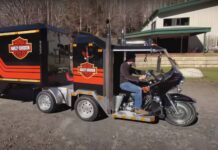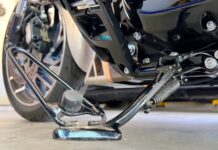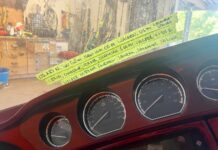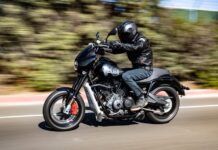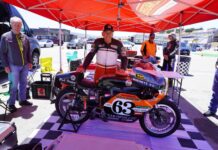It must’ve been seven or eight years ago when I saw the once-familiar face at the V-Twin Expo in Cincinnati. “Brass? Is that you?” It sure was—Richard “Brass” Brassington, proprietor of Wyoming Valley Wheels in Plymouth, Pennsylvania. We spent some time catching up on the 20-plus years since we’d seen each other last. After the trade show, he sent me a T-shirt with his shop logo.
I saw him at the Expo once or twice after that, and I kept my promise of staying in touch by calling him several times in the past few years. After all, Wyoming Valley Wheels was the first independent shop I’d ever stepped foot into, and talking to Brass brought back the old days when I ran with a wild crowd—some of whom hung out at his shop.
Brass started in the motorcycle business for the same reason a lot of bikers did—to get discount parts for himself and his friends. His side business evolved into the need for a shop, and he discovered an out-of-the-way location near the Susquehanna River at the end of Carey Avenue in Plymouth. An old UGI power plant had been abandoned for decades, and he’d found a small brick building that was used for cooling water intake for the plant’s boilers and also housed a lab for testing the quality of the coal needed to run it. So Brass set about the task of cleaning and rebuilding and making it suitable for a motorcycle shop.
He opened the doors of Wyoming Valley Wheels on October 16, 1972, just a few months after Hurricane Agnes caused massive flooding over the entire area. He tells me, “A lot of customers were buying new Hondas with their ‘flood money’ and they’d bring them over to us. We’d turn them into choppers with extended forks, twisted sissy bars, twisted z-bars, king-and-queen seats…”
The property owners also ran Reese’s Harley-Davidson on Main Street in Larksville, less than a quarter-mile from his shop. Brass agreed not to sell anything the dealership sold, so he dealt in “foreign stuff and stuff for older Harleys.” Reese’s went out of business after a few years. Now Brass could sell whatever parts he wanted. Working on Harleys became a big part of his business in the early 80’s, and he started building Harley choppers, and then fat-tire bikes and whatever else was the current style.
In a recent conversation, Brass started reminiscing about days gone by. An assistant district attorney for Luzerne County had a Fat Boy, but he was afraid to go to the shop for quite a while because he’d put away one of Brass’s buddies. The ADA finally did start using the shop for parts and service, and one day after a visit, he tripped on the steps—they were steep, uneven wooden slats and were challenging to navigate. Brass said to him, “You’d better be careful. If you fall down the steps, I’ll have to shoot you and put an unregistered pistol in your hand and say that you were trying to rob me.” The ADA chuckled a little, chewed on that for a few minutes and said, “You know, I think you’re only half kidding.”
There were some incidents that drew unwanted attention over the years. Every August, Plymouth has their kielbasa festival, and Brass always had a customer appreciation party the same weekend. He says, “I had a party in ’05 or ’06, and it was raided even though I checked with everyone to make sure there would be no problems.” He got busted by LCB Agent Hicks, whose supervisor was one of Brass’s customers. The magistrate dropped all charges because he didn’t think the law was applied correctly (Brass: “$10 to see a band and get free beer. What’s the big deal?”), and because Hicks lied on the complaint as well as at the hearing.
On another occasion, the Plymouth cops pulled up to the shop with the lights flashing. “Where’s the fire?” they asked. Brass explained, “I’m burning garbage back there. But it’s in Larksville.” He used that ploy a lot—the property straddled the border of two towns, and whatever department responded to the situation, Brass would claim it took place in the other town. He tells me that the cops in the old days were OK; he’d see most of them at the local bars and go-go joints. But this newer breed? “Some of ’em don’t like bikers.”
When the second landlord took over the property, Brass said, “We had an agreement—I didn’t complain about nothin’ and he didn’t fix nothin’. The place was a shack. He’s a good guy, but once he ‘fixed’ the leaky roof by pouring tar on it and the next time it rained, the tar ran right into the shop.” Eventually the landlord retired from business and put his grandson, a bank executive, in charge of the building complex. “All he was interested in was money,” Brass says. “He kept jacking up the rent. I had all kinds of money into it but he didn’t care.”
Brass suffered a stroke and was out of commission for several weeks. By then, the rent was five times what he’d been paying, so Brass decided it was time to move. He spent the next few years building a new shop while still running the old one, and finally moved the business to his (and my) hometown of Kingston in October 2012, 40 years to the day after he’d first opened.
Brass considers himself semi-retired; he does small jobs like tire changes and he sells parts. But the old shop still stands, just over the pony truss leading to where the old Carey Avenue Bridge used to be. Talking to Brass reminds me of the good old days, and how reckless we were and how bewildering it is to me that any of us are still alive.
I still have that shirt.




